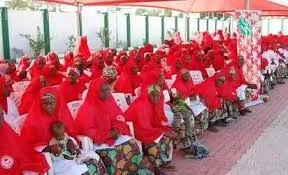
The Cultural Significance of Kano’s N2.5bn Mass Wedding Plan
The Kano State Government has allocated ₦2.5 billion for mass wedding ceremonies to be conducted quarterly across its 44 local government areas in 2025. This initiative is part of the state’s broader social welfare programs.
Commissioner for Planning and Budget, Musa Shanono, highlighted that this allocation is included in the ₦91.32 billion designated for governance and service delivery within the state’s 2025 budget. The mass wedding program aims to promote social responsibility and strengthen societal values.
In addition to the mass weddings, the budget outlines other significant allocations:
- Ramadan Feeding Program: ₦1 billion has been set aside to support feeding initiatives during the Ramadan period.
- Data Collection Surveys: ₦955 million is allocated for manpower statistics, general household surveys, and gathering data on out-of-school children.
- Government Printing Press Enhancements: ₦1.049 billion is earmarked for purchasing printing machines, rehabilitating water systems, and equipping the Government Printing Press library.
- Islamic Programs Support: ₦267.6 million is designated for infrastructure provision, printing of the Islamic calendar, and support for Islamic Da’wah programs, including welfare packages for new converts to Islam.
- Security and Empowerment Initiatives: ₦589 million is allocated for security research, street begging intervention activities, and empowerment development programs.
- Administrative Enhancements: ₦200 million is set aside for procuring office furniture, maintaining the Accountant-General’s office, and developing public financial management reform activities.
The total approved 2025 budget for Kano State stands at ₦719.75 billion, marking a 31% increase from the initial proposal of ₦549.16 billion submitted by Governor Abba Kabir Yusuf. This budget comprises ₦262.67 billion for recurrent expenditure and ₦457.08 billion for capital projects, reflecting a 65% increase compared to the 2024 budget.
The mass wedding initiative has elicited mixed reactions. While some praise it as a commendable social welfare effort, others argue that the funds could be better utilized in areas such as job creation and education to address pressing economic and infrastructural challenges in the state.